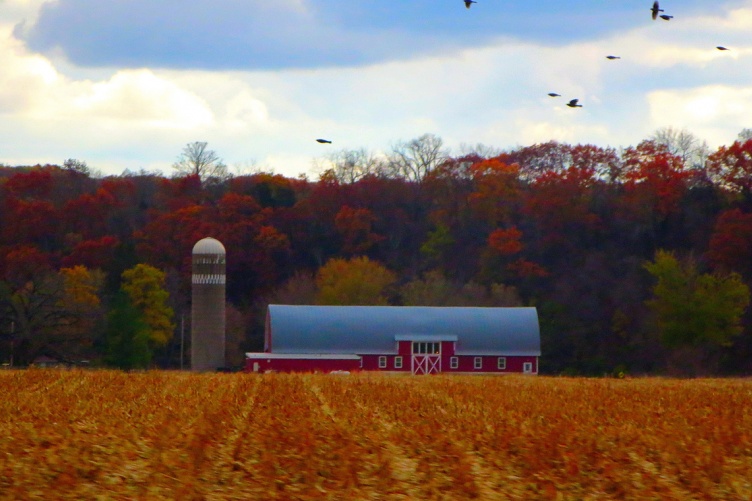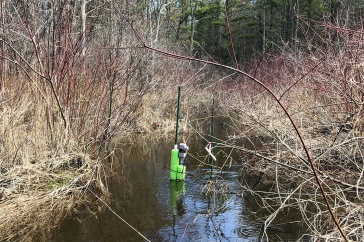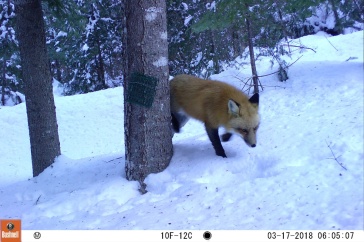
A Wisconsin farm. Credit: Corey Coyle.
Midwest farmers experiencing more erratic rainfall and prolonged dry periods that have devastated crops now have new guidelines to help them manage the effects of climate variability. Researchers with the New Hampshire Agricultural Experiment Station at the University of New Hampshire have created a portfolio of strategic recommendations to guide future agricultural research, policy, and management specifically for the nation’s breadbasket, which are presented in the journal Nature Sustainability.
“Climate change is making rainfall more erratic. Less frequent and larger rain events are going to exacerbate agricultural nitrogen losses. Motivated by such weather-related disasters as the Midwest drought in the summer of 2012 and the floods that followed -- a one-two punch that destroyed crops and flushed so much agricultural run-off into streams that nitrate levels surpassed the EPA’s water quality standards -- we focused our efforts on the Midwest, where farmers are vulnerable to changes in rainfall,” said experiment station researcher Stuart Grandy, associate professor of natural resources and the environment.
Among the recommendations are combining improved practices within crop fields, such as utilizing cover cropping and crop rotations, and around fields, such as integrating strips of perennial plants and restored wetlands. Researchers also recommend taking advantage of new cash crop varieties and emerging technologies that better synchronize nitrogen-fertilizer to plant nitrogen needs, creating a whole-systems portfolio of approaches that will contribute to maintaining yields and environmental quality in the face of erratic rainfall. Finally, the researchers also considered the economic drivers of adopting new practices, outlining the economic risks, limitations to adoption, and opportunities for incentivizing whole-system approaches to managing nitrogen.
Providing an adequate supply of nitrogen is vital for all plants, including agricultural crops; without it, they fail to maintain yields and may die. Most plants get their nitrogen from soil continuously throughout their lives through a process called the nitrogen cycle. And because nitrogen demand usually increases as plants grow, farmers often use nitrogen fertilizer to support agricultural crops. However, when farmers face a variable climate with erratic rainfall and dry spells, soil can lose this valuable supply of nitrogen, resulting in crop losses.
While researchers know precipitation is becoming more erratic, there are very few studies of how nitrogen losses and dynamics respond to rainfall manipulations. Because of this, scientists don’t have specific estimates of how more erratic rainfall – namely longer and more severe dry periods followed by more intense rain – will influence environmental nitrogen loss and crop nitrogen availability. However, based on what scientists do know, UNH researchers expect nitrogen losses to get worse.
“One of society’s grand challenges is figuring out a solution to this conundrum that nitrogen fertilizer is needed for crop production but is also a global pollutant of water and the atmosphere,” Grandy said.
Grandy’s research team at UNH led the study in conjunction with colleagues from the University of California-Davis and the National Center of Atmospheric Research. The team developed the guidelines after analyzing nitrogen data in relation to precipitation patterns, agricultural methods, and ecological concerns. The new guidelines are both eco-friendly and farmer-friendly.
“Our data show already low nitrogen-use efficiencies in crop production. High rates of nitrogen loss will worsen without new management practices. We advocate an approach that takes economic aspects into consideration while also emphasizing that environmental sustainability is key in creating cropping systems that can withstand changing weather patterns,” Grandy said.
The team’s recommendations offer hope not only for the Midwest but other regions increasingly impacted by climate variability.
“If an agricultural ecosystem’s overall resilience to fluctuating conditions is improved, farmers and the environment will both win. Crops will thrive, water quality will improve, and fewer greenhouse gasses will escape into the atmosphere,” said lead author Tim Bowles, now an assistant professor at the University of California, Berkeley.
Additional researchers involved with this project include NH Agricultural Experiment Station scientist Shady Atallah, UNH Department of Natural Resources and the Environment; Eleanor Campbell, UNH Earth Systems Research Center; Amélie Gaudin, UC Davis Department of Plant Sciences; and William Wieder, Climate and Global Dynamics Laboratory, National Center for Atmospheric Research, and the Institute of Arctic and Alpine Research, University of Colorado.
This research is presented in the journal Nature Sustainability (DOI: doi.org/10.1038/s41893-018-0106-0). This material is based upon work supported by the NH Agricultural Experiment Station, through joint funding of the National Institute of Food and Agriculture, U.S. Department of Agriculture, under award number 1007001, and the state of New Hampshire. Support also was provided by a U.S. Department of Agriculture Agriculture and Food Research Initiative Education and Literacy Initiative (AFRI ELI) postdoctoral fellowship (2017-67012-26094), U.S. Department of Agriculture (NIFA 2015-67003-23485), U.S. Environmental Protection Agency, the Kellogg Biological Station Long-term Ecological Research Program, and GRACEnet.
Founded in 1887, the NH Agricultural Experiment Station at the UNH College of Life Sciences and Agriculture is UNH’s original research center and an elemental component of New Hampshire's land-grant university heritage and mission. We steward federal and state funding, including support from the USDA National Institute of Food and Agriculture, to provide unbiased and objective research concerning diverse aspects of sustainable agriculture and foods, aquaculture, forest management, and related wildlife, natural resources and rural community topics. We maintain the Woodman and Kingman agronomy and horticultural research farms, the Macfarlane Research Greenhouses, the Fairchild Dairy Teaching and Research Center, and the Organic Dairy Research Farm. Additional properties also provide forage, forests and woodlands in direct support to research, teaching, and outreach.
-
Written By:
Lori Tyler Gula, PhD | NH Agricultural Experiment Station | lori.gula@unh.edu | 603-862-1452
















































